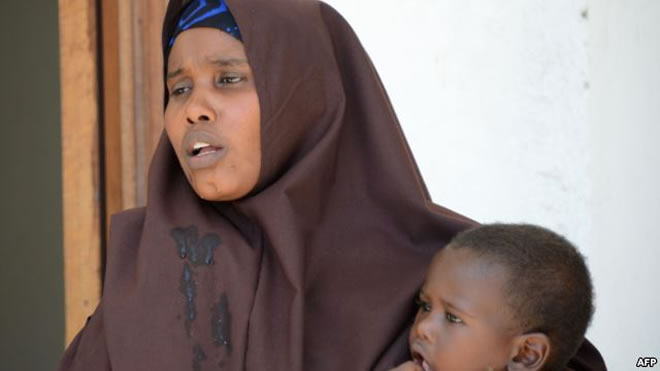
By Mohammed Yusuf
Monday, February 2, 2015

FILE - A Somali woman, who was sentenced to a year in jail after she told a reporter she was raped by security forces, holds her baby at the court house in Mogadishu, March 3, 2013.
FILE - A Somali woman, who was sentenced to a year in jail after she told a reporter she was raped by security forces, holds her baby at the court house in Mogadishu, March 3, 2013.
NAIROBI, KENYA— A new report says Somali women and girls from minority clans are more vulnerable to sexual violence due to poverty, marginalization and discriminatory attitudes. The perpetrators include members of dominant clans, militias and security forces, and even African Union soldiers.
A new report, titled "No One Cries for Them," highlights challenges faced by Somalia’s minority women at the hands of dominant clans, armed men and security forces.
Minority Rights Group Gender Program Coordinator for Somalia Christine Uyoga said minority people are marginalized politically, economically and socially - leading to abuse.
“They have been excluded for things to do with participation. If you look at political participation we do not have [the] minority community represented there," said Uyoga. "When we go to humanitarian aid, access is difficult for the minority community, and particularly women and children. If you look at education system in Somalia, we do not still have inclusion for the enrollment of the minority children to the education system in Somalia.”
The report also documents the widespread prohibition of intermarriage. For example, it is socially acceptable for a woman from a majority clan to marry across dominant clans, but it is socially unacceptable for a woman or man from a minority clan to marry someone from a majority clan.
Most of Somalia’s minorities live in the southern part of the country. In 2002, the United Nations Office for the Coordination of Humanitarian Affairs estimated minority clans comprised one third of the country’s 11 million people.
Uyoga said under Somalia's clan system, even the kind of work a person performs can exclude that person from the mainstream population.
“The cause is clan dynamism that is on the ground in Somalia, because the minorities are also clustered different, most of the minorities particularly in Somalia they are occupational minorities," said Uyoga. "So they look at the kind of work they do and they look at their skills and they say that now we are sidelining them because of this.”
Mariam Yassin, the director of the non-profit IIDA Women’s Development Organization, said her group seeks equal opportunities for minority communities.
She said her organization believes in "equality and justice, and this is what God has mentioned in the Quran. Yassin said it is part of Somalia's culture and constitution.
Yassin said the group is "not asking for something that is impossible, that it is possible to get justice and equality" and, she added, "peace cannot be achieved while Somalis are confronting each other and segregating others.”
Under Somalia's Federal Charter, political power is dominated by four major clans and smaller influence given to minority clans, under what is known as the 4.5 plan. That arrangement has been blamed for division in the country and frequent political bickering.
EU special envoy to Somalia Michele Cervone d'Urso said the country needs a new democratic process that can achieve equality and unity.
“In 2016 we will have a new democratic process in that case it will not be based on 4.5, it should be far more linked to actual realities of the Somali population, including of course minority groups, and we are moving toward that ... because the 4.5 is artificial to some extent, very simplistic and artificial,” said d'Urso.
Some representatives from minority groups have welcomed the political initiative trying to break from the traditional clan politics, but they say equality and justice need to be felt in every part of Somalia, socially and economically.
Source: VOA